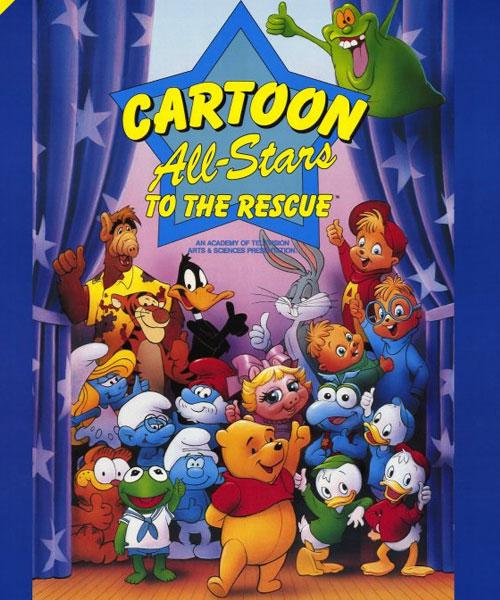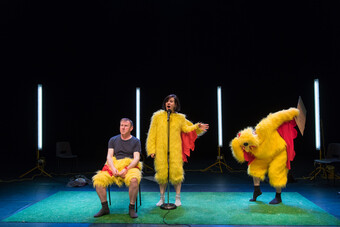Playwriting All-Stars to the Rescue
One Saturday morning when I was a kid, I watched a television special called Cartoon All-Stars To the Rescue, and it was really great because Garfield, Winnie the Pooh, and three of the Muppet Babies, not to mention Alvin and the Chipmunks, the Smurfs, Bugs Bunny, and Michelangelo (of the Ninja Turtles), were all appearing together. I remember feeling proud of myself for having watched this special; like how I felt after finishing all my string beans. Cartoon All-Stars, you see, was good for me. It was “topical.”
“Topical” is tricky to define, yet I encounter it often as a young playwright, in the guidelines for certain contests and in the mission statements of certain companies. It doesn’t always appear in the same form: “socially conscious,” “relevant,” and “political” are common substitutes. When I hear that a company is accepting unsolicited submissions, I get excited. When I discover that they are only interested in plays about a certain “issue,” a red flag goes up. Cartoon All-Stars was about one such “issue.” The plot hinges upon a teenager named Mike who has started smoking marijuana and drinking beer. That is where the All-Stars come in. As President George H. W. Bush explained in his televised introduction, “Some of [my] favorite cartoon characters will help [me] understand how drugs and alcohol can ruin [my] life.” How did they do it? Not only by helping Mike get clean and sober, but by offering up some choice quotes:
“There’s nothing cool about a fool on drugs.”—Baby Kermit
“You’re excellent just the way you are, without drugs.”—Michelangelo
“What’s up, Doc, is your life…if you don’t cut it out.”
You can probably guess who uttered that last one. But see what happens when you try to write something “topical”? Bugs would never say something that proscriptive, right? And Baby Kermit never gave advice; he took it…from Nanny. I guess what I am trying to say is, although I felt proud of myself for watching Cartoon All-Stars, I wasn’t fooled by it, and when I think about all the reasons I loved Muppet Babies or Looney Tunes growing up, I can say without a doubt that Cartoon All-Stars is not one of them.
I know what you’re thinking; the analogy is unfair. Plays of social relevance are not equitable to public service announcements disguised as entertainment. And you’re right. I’m thinking of one of my favorite productions of the last couple years: Ruined by Lynn Nottage at Manhattan Theatre Club. In his New York Times review of Ruined, Ben Brantley wrote that the play is “stocked” with, among other things, “informative topical detail” (emphasis mine). I would agree, having gone into the theater with, I am ashamed to say, little knowledge of the history of violence towards women in the Democratic Republic of the Congo, and coming out with a lot more. I am grateful that watching Ruined raised my awareness of a serious human rights issue, but I do wonder how much receiving that information had to do with my response to the play. As an audience member, I laughed, I cried, I gasped…I reacted in all the ways I want an audience to react to my own work, the ways I bet a lot of us want audiences to react when they watch our work, but I did that because it was a good story well told, not because of the subject matter.
Isn’t what makes for a topical subject today dated by tomorrow? On the other hand, who can ever say what plays will live on and what plays will not? If we really want to engage with living audiences right now, shouldn’t we be writing about the issues confronting our society this very minute?

I have always aspired to being a “serious” playwright, but my work tends to go in a light direction. I often take my cues from Elizabethan comedy, Jewish humorists, and farce. I do not mean to say that comedies cannot be serious, or that plays about romantic entanglements or family quarrels do not have weight, but I do not believe that my work so far has ever raised anyone’s awareness about a hot-button issue the way that Ruined did for me. Should we, as a community, use subject matter as a factor in determining the value of any given play?
It’s a tricky road to go down, if you ask me. Isn’t what makes for a topical subject today dated by tomorrow? On the other hand, who can ever say what plays will live on and what plays will not? If we really want to engage with living audiences right now, shouldn’t we be writing about the issues confronting our society this very minute?
I now submit Exhibit B, courtesy of J. T. Rogers, author of Blood and Gifts, which had a recent run at Lincoln Center. In my opinion Rogers’s new play is gripping, just like Ruined, and like Ruined it has a lot to teach us, this time about the history of U.S. involvement in Afghanistan and the causes for 9/11. I am an admirer of Rogers’s plays, which often draw upon current or recent events, so I was not surprised to come across these statements in his 2008 Laura Pels Keynote Address:
[A]s a playwright my greatest fear is making work that is irrelevant. Of writing plays that have nothing to say about the world I actually live in.
[W]e have to collectively broaden the scope of the plays we write and the plays we put on. Internationalize, globalize—whatever we want to call it…[We] have to start dramatizing the stories of people from countries and cultures different from our own.
Nowhere in this speech does Rogers mention the words “topical theater,” but I think it is clear from what he does say that, in the age of globalization, he wants to make sure we playwrights still read the news. What if, better yet, we are actually a part of events in the news?
Last fall I took part in some of the protests related to Occupy Wall Street. I was reluctant to join the movement at first because I did not understood what the Occupiers stood for, if anything. But I am in my late twenties, with four years of experience as a grant writer and a degree from an Ivy League college. I got laid off six months ago and have had to take a part-time job; I had no health insurance for over a year, and my bank keeps charging me service fees for, well, for not having enough money to put in my account, I guess. So I am angry, and not just on my own behalf. In trying to understand the causes of the current crisis, I have begun to read up on the history of America’s financial industry and its ties to the federal government. Ron Suskind’s book Confidence Men, about the Obama administration’s handling of the crisis in the early days of the president’s tenure, has proven particularly infuriating to me. Factoring in what I learned from this research, and my own financial situation, the chance to be a part of an expression of communal rage began to make sense to me.
Not only does Occupy Wall Street allow for people from many different walks of life to meet each other and commune over a shared loss of faith in the current system, it has inspired the creation of lending libraries, performance art, music and public debate. This is nonviolent civil disobedience at its finest, and I am proud to have been a part of it. In fact, I do not think I have felt as American since I served on a jury a few years ago. In my mind, both are prime examples of fulfilling my civic duty.
It seemed only natural that I should want to write a play about this experience, drawing on what I had read and seen, not to mention the zeal that I felt upon joining the protest. Some images began to take shape: tense CEOs meeting in a backroom, the ghost of Alexander Hamilton waking the President in the night to give advice…Finally, I thought, I was having the itch to write something undeniably topical.
And then a few weeks later, at a friend’s birthday party, another guest I did not know struck up a conversation with me. Things began congenially enough (over beer, I should add), but they turned sour when we began talking about our careers. I explained that I was an artist, and that I had a full-time job but was let go, and had taken a part-time job to support myself. This other guest explained that he was in a similar situation. He was working as a bank teller to make ends meet after having been let go from his job as…an investment banker who specialized in mortgage-backed securities.
Now I don’t know what it was, maybe that I was still plowing through Confidence Men, maybe that I was longing to be back at Zuccotti Park, or maybe it was simply, dare I say, the beer, but hearing him say those words, I could not control myself. As far as I was concerned, the guest I was talking to had disappeared, evaporated into thin air, only to be replaced by Timothy Geithner, Alan Greenspan, Ayn Rand, that guy with the monocle from the Monopoly board…anyone who had ever been a proponent of capitalism, you name him, he was there, and I was mad at him. I screamed, railing against the system and the people responsible for it, people like this guy at the party. When I was finally done, and the rogues’ gallery of free market champions had disappeared, this poor man was sweating profusely, the party music had stopped, and everyone was staring at me.
I left the party soon after. I was embarrassed, naturally, but I was also sad. Not only did I lose my temper, I made a truly disheartening discovery. Railing against the financial industry may have been entirely justified in my mind, but it was not at all satisfying. And worse, I couldn’t think about it without becoming angry all over again. I lost all desire to write that topical play. After all, if I could not get through ten minutes on the subject of Wall Street without blowing a fuse, how could I possibly spend months, maybe a year, creating characters and building a plot centered around this theme?
Perhaps I am just not cut out to write topical theater. Human rights, civil rights, workers’ rights…these are causes I believe in, but can any one of them be my muse? I am thinking of Rogers again, and of Nottage, and of all the living, breathing playwrights whose work has moved me, and I am feeling a bit defeated. Not only are these artists magnificent playwrights, they are important ones, and I gather that has something to do with their writing from a place of civic responsibility.
In conclusion, I can only say that I write from a place of responsibility too, or try to. I have an artistic responsibility to write in a way that plumbs the depths of my soul, that gets at the root of what makes me me, to produce work that is honest and raw and original. I think we all share that burden. For some of us, our civic responsibility overlaps with our artistic one; for others, it does not. But I do not believe it matters so much what we write about, it is that we write. And whether the work itself is intimate or expansive, naturalistic or epic, dream play or docudrama, in writing it we get to be part of what Rogers has called “a larger public discussion of where we are going and who we are becoming.” We might not all be Occupiers, we are definitely not “cartoon all-stars,” but in this one way, we are all of use.










Comments
The article is just the start of the conversation—we want to know what you think about this subject, too! HowlRound is a space for knowledge-sharing, and we welcome spirited, thoughtful, and on-topic dialogue. Find our full comments policy here
I enjoyed your post Matthew. Seeing the "topical" theme request for play submissions also creates ? for myself. Personally good playwriting for me is a unique blend of good story stelling, creative use of language and action that heightens life and the stakes of the story, a new revelation of truth [even refreshed truth expressed in a new way], like you said something raw and thus fresh [either in the story, writing, or perspective], and honest [it does not try to impress or preach - it simply is what it is - even if grand]. This kind of writing can exist in a piece about violence against women in the Democratic Republic of Congo, or violence against women living in Salem, MA during the 1600's, because it takes a story and works it in such a way that something worthwhile about the human condition is offered, revealed, clarified. I think if you read over your article again you might actually see the broad brushstrokes of an outline for your "topical" play dealing with the financial crisis, your play, from your perspective, told in a way that perhaps was not originally intended. Hope you have the party scene in it.